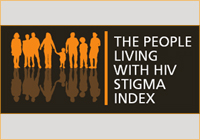
Feature Story
United Kingdom rollout The People Living with HIV Stigma Index
30 November 2009
30 November 2009 30 November 2009
An index that documents the stigma experienced by people living with HIV in the country has been launched at the Houses of Parliament, London, United Kingdom.
Speakers at the launch included His Excellency Kenneth Kaunda, First President of the Republic of Zambia, Rt. Hon Andy Burnham MP; Secretary of State for Health, Annie Lennox, singer and founder of The SING Campaign and members of the community research team. The launch was chaired by David Borrow MP, Chairman of the All-Party Parliamentary Group on AIDS.
The UK is the first country in Europe to undertake a full rollout of The People Living with HIV Stigma Index initiative— a pioneering community research and advocacy initiative that has been developed by and for people living with HIV to measure and document how people have experienced—and been able to challenge and overcome—stigma and discrimination relating to HIV.
More than 20 other countries in Asia, Africa, Latin America and the Pacific are also working with the Index supported by an international partnership between International Planned Parenthood Federation (IPFF), in partnership with UNAIDS, the Global Network of People Living with HIV (GNP+), and the International Community of Women with HIV/AIDS (ICW). The UK initiative has been supported by the M.A.C. AIDS Foundation, UK Department for International Development and the Scottish Government.
When it comes to crying, shouting, speaking out against stigma, I have done it. But I have been struggling with the evidence to quantify it. As a researcher and as an advocate, I now have the missing link.
The programme follows similar rollouts in Bangladesh, China, Ethiopia, Fiji, Kenya, Nigeria, Pakistan, Thailand and Zambia.
Talking about the role of the index in the AIDS response, a Stigma Index Researcher in Uganda said, “When it comes to crying, shouting, speaking out against stigma, I have done it. But I have been struggling with the evidence to quantify it. As a researcher and as an advocate, I now have the missing link.”
The index aims to increase the understanding of how stigma and discrimination is experienced by people living with HIV and then use the evidence gained to shape future programmatic interventions and policy change.
Stigma and discrimination constitute one of the greatest barriers to dealing effectively with the AIDS epidemic. They discourage governments from acknowledging or taking timely action against AIDS and deter individuals from finding out about their HIV status. They inhibit those who know they are infected from sharing their diagnosis and taking action to protect others and from seeking treatment and care for themselves.
The process of empowering people living with HIV, their networks and communities is crucial. The index aims to be both a catalyst for creating and fostering change in the communities in which it is used.
The index works towards more effective communication, education and outreach about laws protecting people living with HIV in countries where it is being implemented, so that people living with HIV know their rights. Its aim is to inform policy and practice relating to human rights, confidentiality and testing, especially for young people.
The information gained from the index, collected by people living with HIV, will provide evidence for the success (or failures) of current programmes and highlight neglected areas requiring future action. These include improving workplace policies, informing debates about the criminalisation of HIV transmission, and promoting the realization of human rights.
Consequently, the index hopes to be an advocacy tool which will support the collective goal of governments, non-governmental organisations and activists alike to reduce the stigma and discrimination linked to HIV.
In its joint action for results paper, the Outcome Framework 2009-2011, UNAIDS calls the removal of punitive laws, policies, practices, stigma and discrimination that block effective
responses to AIDS and core to this collaboration “with civil society and stakeholders to uphold non-discrimination in all efforts, countering social judgement and the fear that feeds stigma.”
United Kingdom rollout The People Living with HIV
Partners:
UK Department for International Development
International Planned Parenthood Federation
Global Network of People Living with HIV
International Community of Women with HIV/AIDS
Feature stories:
UNAIDS Executive Director, Yao Ming and Government launch campaign against discrimination in China (27 november 2009)
People Living with HIV Stigma Index (28 August 2008)
External links:
People Living with HIV Stigma Index web site
Publications:
The People Living with HIV Stigma Index: User guide for teams implementing the Index in their communities
Reducing HIV stigma and discrimination: a critical part of national AIDS programmes - a resource for national stakeholders in the HIV response (pdf, 598 Kb.)



